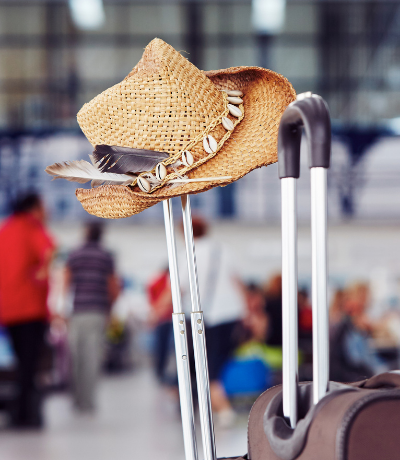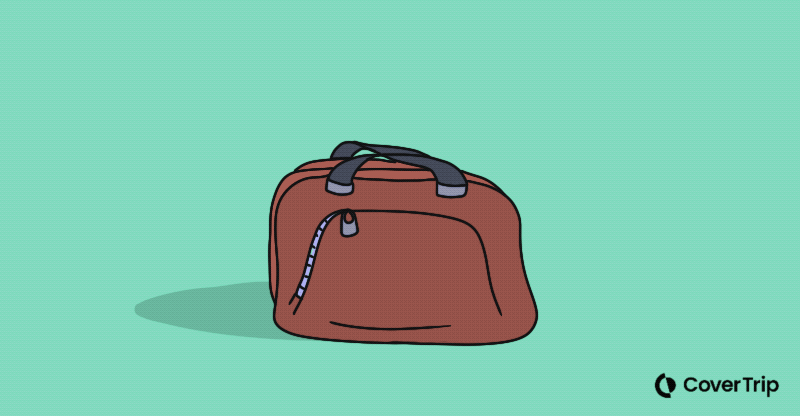How to choose between hard or soft luggage
If you’re in the market for a new suitcase, you’ve got a lot of options. Here’s how to choose between a soft or hard bag.
22 April 2022
Ready to buy a new suitcase?
Ask any traveler whether they prefer a hard or soft suitcase and you’ll get an earful. It makes sense. What type of luggage you choose, hard or soft, is a very personal choice.
If you’re in the market for a new suitcase, you’ve got a lot of options. While it’s useful to note that soft-shell luggage still dominates the US market, hard-shell bags are winning over some travelers thanks to new light-weight materials (according to consumerreports.org).
Can’t decide between a soft or hard shell suitcase? Here are the questions to ask yourself, and a hint: it’s all in how you prefer to travel.

Do you check your luggage or carry it on the plane?
It’s no lie that checked luggage takes a serious beating. They don’t call it ‘throwing the bags’ for nothing and there’s no easier way (yet) to get all those bags across the airport and into the right plane. It takes human power to empty and reload a plane in less than an hour.
Here’s how checked luggage can get damaged according to to an airline baggage handler:
- Loose ends can get caught in automated belts, tearing straps, zippers, or tags
- Handles can break off if the bag is very heavy
- Cheap bags are flimsy and will fall apart fairly quickly
If you prefer to check your bags, buy a high-quality hard-shell suitcase with four wheels (the “spinners”). These bags are rolled down the belly of the plane (not tossed) and the contents suffer less damage.
If you prefer to carry on, soft-shell luggage is easier to manipulate into overhead bins. These bags also take less room to store at home.
When and where are you traveling?
Softer suitcases can absorb water and are more susceptible to stains, but they can be cleaned too.
If you’re traveling through rain or snow, for example, a hard-shell bag will provide better protection for what’s inside. A hard-shell bag can be easier to maneuver across gravel or cobblestones too.
Hard-sided luggage also stacks easily, which makes it ideal for cruise ships where bags are stacked up before departure.
What’s typically packed in your bag?
If you pack electronics like an iPad or high-end camera, for example, in your suitcase a hard-shell bag will provide better protection whether you check it or not. The same is true for bottles of wine or alcohol.
Fragile items and soft-sided suitcases don’t typically go together.
Pro tip: if you pack anything valuable, make sure you use a TSA-approved lock on whatever bag you choose.
Are you a light or heavy packer?
This is a tricky question because it’s relative, but here’s the point: a hard-shell suitcase doesn’t give like a soft one does. If you tend to overpack, a hard-sided bag could either rein in your tendencies or frustrate you.
If you’re a light packer, a softer suitcase is the way to go because you can tighten up or expand the outer shell according to your trip.
Do you shop when you travel?
If you like to buy lots of things when you travel, you may find it difficult to fit those extra items into a hard-shell bag that’s already full.
Most hard-shell luggage is not expandable, but soft luggage can stretch around the edges, so a few extra items will fit in easily.
Still not sure?
Still not sure what bag to take on your next trip? Check out the face-off between two Condé Nast Traveler editors with very different opinions.
If you really can’t decide between a hard- or soft-sided suitcase, look into the hybrid bags with a hard bottom and a soft top. Gives you the strength and maneuverability of a hard suitcase with the flexibility of a soft shell bag.
Related topics
Damian Tysdal is the founder of CoverTrip, and is a licensed agent for travel insurance (MA 1883287). He believes travel insurance should be easier to understand, and started the first travel insurance blog in 2006.
